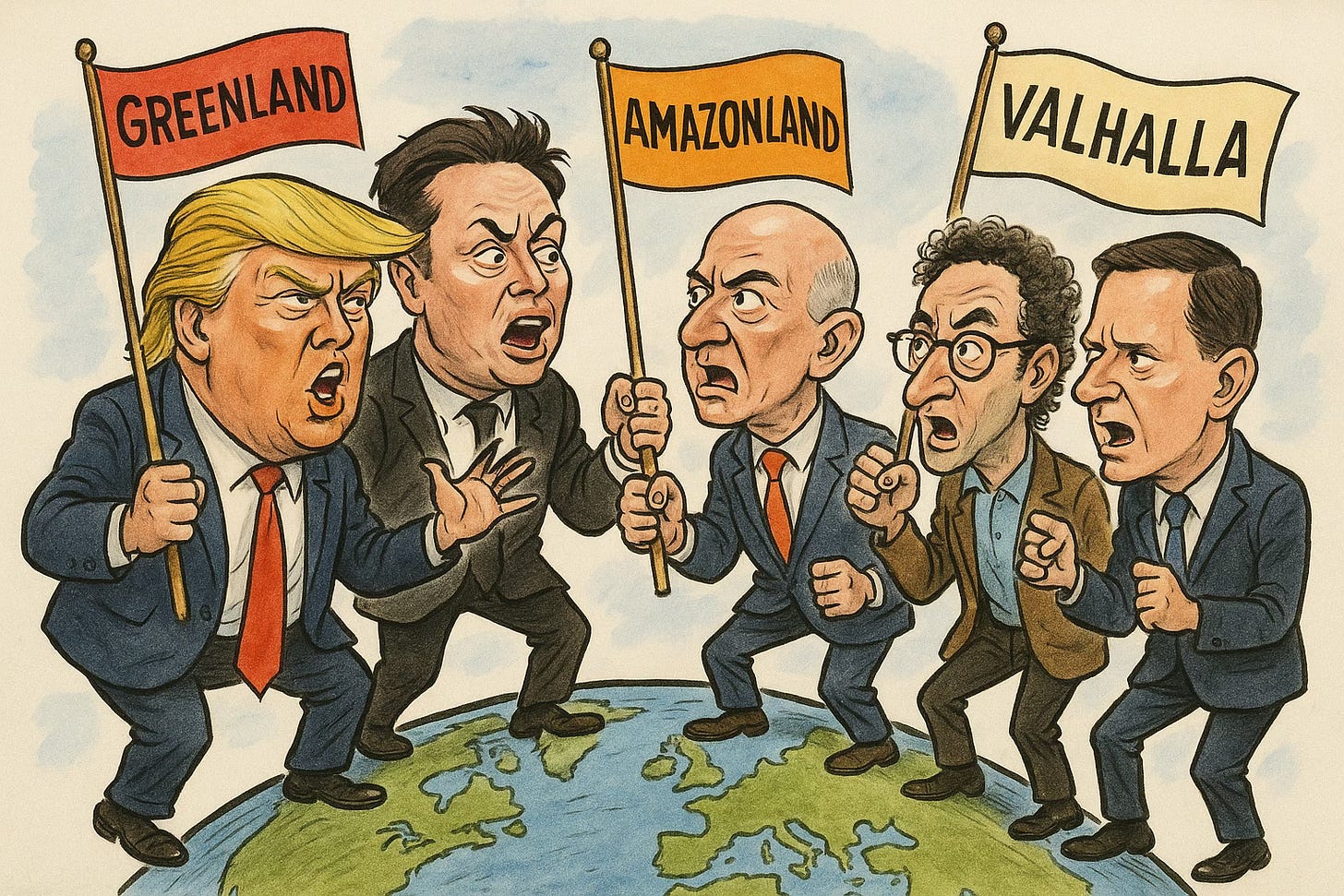- Pascal's Chatbot Q&As
- Posts
- GPT-4o: This ideology co-opts the rhetoric of planetary concern (climate change, space exploration, AI, resource scarcity) to justify nationalistic, competitive & often exclusionary political agendas.
GPT-4o: This ideology co-opts the rhetoric of planetary concern (climate change, space exploration, AI, resource scarcity) to justify nationalistic, competitive & often exclusionary political agendas.
Influential actors—especially populist leaders and tech moguls—are pursuing profit and power under nationalist banners, often undermining or bypassing global institutions.
Essay: Confronting the Rise of Planetary Nationalism
by ChatGPT-4o
1. Overall Message
“The New Planetary Nationalism,” by Boris Shoshitaishvili and Lisa H. Sideris, presents a provocative and timely warning: as global crises and technologies outgrow national boundaries, a disturbing political trend is intensifying—planetary nationalism. This ideology co-opts the rhetoric of planetary concern (climate change, space exploration, AI, resource scarcity) to justify nationalistic, competitive, and often exclusionary political agendas. The authors argue that while technoscientific power has become planetary in scale, corresponding governance structures and cooperative frameworks have not kept pace. Instead of fostering collective planetary responsibility, influential actors—especially populist leaders and tech moguls—are pursuing profit and power under nationalist banners, often undermining or bypassing global institutions.
From the Space Force’s echo of the Monroe Doctrine to Russia’s opportunistic view of climate change, and Silicon Valley’s libertarian “freedom cities,” the authors identify a consistent pattern: the use of global challenges not to build shared governance, but to assert national or private dominance. The piece calls for urgent development of equitable, cooperative planetary governance structures that match the scale of the challenges humanity faces.
2. Agreement and Justification
Yes, I agree with the authors’ central thesis. Their argument is both insightful and substantiated by real-world developments. Nationalism has not receded in the face of globalization and shared ecological crises; rather, it has adapted, expanding its scope to include outer space, climate change, and AI development. What’s particularly convincing is their emphasis on how planetary technoscience (AI, climate engineering, space colonization) is accelerating faster than our ability—or willingness—to regulate it collectively.
For instance, the creation of the U.S. Space Force and its language around “space superiority” demonstrates how space is now viewed as another arena for geopolitical competition. Similarly, the authors highlight how figures like Elon Musk exploit planetary rhetoric while aligning with nationalist movements that reject multilateral governance (e.g., withdrawal from the Paris Agreement).
Moreover, the commodification of planetary crises—such as viewing climate change as an agricultural opportunity for Russia or as a mining bonanza in Greenland—exposes the danger of treating planetary collapse as a zero-sum game. It is a compelling warning that nationalist responses to global problems not only fail to solve them but actively compound them.
3. Supporting Evidence in External Sources
Numerous developments support the authors’ view:
AI nationalism: The U.S. and China are locked in a technology arms race, with each framing AI development as essential to national security and global dominance. The Biden administration’s 2023 executive orders on AI governance emphasize competitiveness with China.
Climate opportunism: A 2020 Russian climate strategy openly acknowledged the benefits of warming for Russian agriculture and territorial development, confirming the article’s observation of climate being viewed through national interest lenses.
Techno-utopian libertarianism: Companies like Praxis and Seasteading Institute are pursuing offshore or autonomous “network states” to escape national regulation—a privatized form of planetary nationalism.
Space as a new frontier for competition: Scholars like Mary-Jane Rubenstein have documented how the commercial space race (e.g., SpaceX, Blue Origin) mirrors colonialist logics, while NASA and DoD projects increasingly invoke nationalist missions rather than planetary stewardship.
Weak planetary governance: The ineffectiveness of global institutions like the United Nations to enforce climate agreements, or the failure to coordinate equitable vaccine distribution during COVID-19, reveals a systemic lag between planetary needs and global cooperation.
4. What Countries Should Do
To counter the rise of planetary nationalism and its risks, countries should:
Strengthen international institutions like the UN, IPCC, and WHO with real enforcement mechanisms and funding.
Establish new planetary governance bodies tasked with AI oversight, space law, and geoengineering ethics, including participation from the Global South.
Revise legal frameworks such as the Outer Space Treaty to account for corporate and state competition over space.
Develop shared planetary ethics, using frameworks like the Earth Charter to guide climate, technology, and resource decisions.
Foster technological cooperation instead of zero-sum competition—through multilateral AI safety agreements, joint climate engineering protocols, and open science collaborations.
Educate populations on planetary interdependence and the dangers of exclusionary nationalism in an interconnected world.
Incentivize planetary innovation that serves global needs (e.g., climate mitigation, biodiversity preservation) over national power.
5. Consequences of Inaction
If planetary nationalism continues unchecked, the world may face:
Resource conflict: Competition over Arctic routes, rare earth minerals, and habitable land could provoke geopolitical tensions or war.
Space militarization: Without cooperation, Earth’s orbit could become a battleground, damaging satellites and essential communications infrastructure.
AI risk escalation: Without global coordination, the AI arms race may produce uncontrollable systems, economic shocks, or autonomous weaponry.
Climate apartheid: Wealthier nations fortify their borders while letting poorer regions collapse under climate pressure—leading to mass displacement, instability, and injustice.
Collapse of global cooperation: Climate agreements, pandemic responses, and economic frameworks may erode, replaced by fragmented, hostile blocs.
Authoritarian tech enclaves: Private cities or “network states” governed by tech billionaires could become unregulated power centers, undermining democratic norms and human rights.
Ecological tipping points: Disjointed and competitive responses to ecological collapse may lock humanity into runaway climate change, species extinction, and biosphere degradation.
Conclusion
The essay is a crucial intervention in an era where planetary scale crises require global cooperation—but are increasingly met with nationalistic and profit-driven responses. Shoshitaishvili and Sideris rightly identify that technoscientific acceleration, coupled with political fragmentation, is pushing us toward a future of intensified competition rather than solidarity. Their call for planetary governance is not idealistic—it is essential. If the planetary age is to be one of survival and flourishing rather than exclusion and collapse, we must urgently rebalance power away from planetary nationalism toward shared, accountable planetary stewardship.

·
16 MAR

A Plea for Anti-Billionaire Regulation: Safeguarding Society, Civil Rights, and Democracy